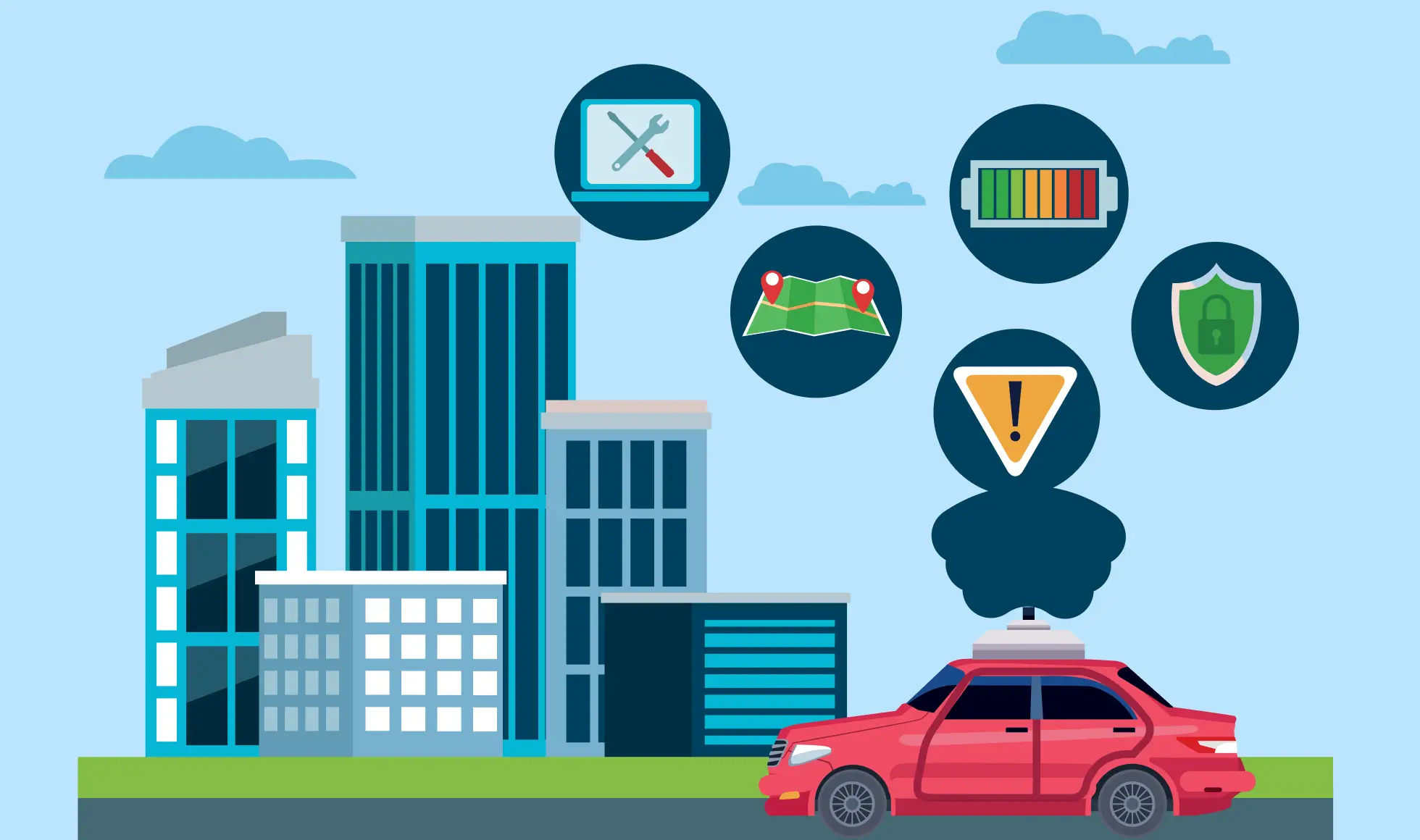Energy Management Systems (EMS) in Electric Vehicles (EVs) are crucial for optimizing performance, range, and cost-effectiveness. They address challenges faced by EV users, such as range anxiety, charging infrastructure limitations, and battery management concerns. To overcome these challenges, the software development industry offers innovative solutions to these problems, providing real-time information, optimization tools, and support services.
Understanding energy management systems in EVs
An EMS is a system that manages the flow and usage of energy in an EV. It consists of components like sensors, controllers, and software. EMS optimizes energy consumption by analyzing factors like speed, acceleration, and battery state. It helps in efficient battery management and charging strategies.
While everything is sorted from the vehicle side, the owner of the vehicle as well as the manufacturers needs to be relayed this information. That’s where apps and interfaces come into play. Smart energy management eases the intricacies of the process and relays the information in simple actions that makes it easier for the user to act. EMS also optimizes energy consumption by analyzing factors like speed, acceleration, and battery state. It helps in efficient battery management and charging strategies.
IT challenges hampering the growth of electric vehicles

From an IT perspective, the widespread adoption of electric vehicles (EVs) is still hindered by several key challenges. These challenges primarily revolve around the integration of technology, data management, and infrastructure:
1. Data management and analytics
Data volume and complexity: EVs generate vast amounts of data, including vehicle performance metrics, battery health information, charging history, and real-time traffic data. Efficiently managing and analyzing this data is crucial for optimizing EV operations and improving user experience.
Data security and privacy: Protecting sensitive data, such as driver information, vehicle location, and charging history, is paramount. Ensuring robust security measures and compliance with data privacy regulations is essential.
Real-time data processing: EVs require real-time data processing for tasks like navigation, range estimation, and charging optimization. Developing efficient algorithms and infrastructure to handle this is a challenge.
2. Charging infrastructure and connectivity
Interoperability: Ensuring compatibility between different charging stations and EV models is crucial for seamless charging experiences. This requires standardization and interoperability protocols.
Network connectivity: Reliable network connectivity is essential for EV owners to access charging station information, navigate routes, and receive software updates. Challenges arise in areas with limited or unreliable network coverage.
Payment and authentication: Implementing secure and efficient payment and authentication systems for charging stations is critical. This involves integrating with various payment providers and ensuring data security.
3. Vehicle-to-grid (V2G) integration
Technical challenges: Integrating EVs with the power grid for V2G use-case requires advanced bidirectional power flow management and grid stability control.
Regulatory hurdles: Establishing clear regulations and standards for V2G operations is essential to facilitate its adoption and address safety concerns.
4. Software development and updates:
Over-the-Air (OTA) updates: Ensuring timely and secure OTA updates for EV software is crucial for addressing bugs, improving features, and enhancing security.
Compatibility issues: Maintaining compatibility between EV software and various hardware components, charging infrastructure, and network technologies can be challenging.
Addressing these IT challenges will be crucial for accelerating the adoption of EVs and ensuring a smooth transition to a more sustainable transportation future.
Next-gen solutions for efficient EV energy management system

While the world is trying to shift their focus towards renewable sources of energy, electric vehicles are destined to boom in coming years. For that to happen, the IT sector is giving all the support for building a sustainable energy management system for EVs.
App-based charging solutions
When it comes to doing things on-the-go, there’s nothing more accessible than mobile phones. Hence, every industry is inclined towards having applications that support their use-case. Here’s what EV has to provide from apps.
Real-time charging station information:
Apps can provide users with up-to-date information about charging station locations, availability, and compatibility.
Navigation and routing optimization:
By considering charging infrastructure and driving routes, apps can optimize journeys for efficient charging stops.
Payment integration and loyalty programs:
Apps can integrate with payment gateways and offer loyalty programs to streamline the charging process and provide incentives.
Smart grid integration:
Apps can connect EVs to smart grids, enabling intelligent charging scheduling and contributing to grid stability.
Battery health monitoring and management software
The health of an electric vehicle's (EV) battery is a critical factor in determining its performance, range, and overall lifespan. Effective battery management is essential to ensure optimal operation and minimize maintenance costs. The continuous development of innovative tools and software that can monitor battery health, predict potential issues, and provide personalized recommendations for optimizing battery lifespan.
Remote monitoring:
Apps can monitor battery health metrics, such as state of charge, state of health, and temperature, providing users with real-time information.
Predictive maintenance:
By analyzing battery data, apps can predict potential issues and alert users to schedule preventive maintenance.
Personalized recommendations:
Based on usage patterns and battery condition, apps can offer personalized recommendations to optimize battery lifespan.
Integration with BMS:
Apps can integrate with the vehicle's battery management system (BMS) for enhanced safety and efficiency.
Range anxiety mitigation
Range anxiety, or the fear of running out of battery power, is a common concern among electric vehicle (EV) owners. To address this issue, innovative technologies and applications have emerged that provide accurate range estimates, offer personalized driving tips, and integrate with route planning features. These tools empower EV drivers to make informed decisions and maximize their vehicle's range.
Accurate range estimation:
AI/ML plays a significant role in providing accurate range estimates based on factors like driving conditions, traffic, and charging infrastructure.
Personalized driving tips:
Apps can offer personalized driving tips and recommendations to help users maximize range.
Integration with route planning:
Apps can integrate with route planning features to help users plan trips efficiently, considering charging stops.
Energy efficiency optimization
Optimizing energy efficiency is crucial for maximizing the range and performance of an EV. Advanced technologies and apps can play a significant role in helping drivers adopt eco-friendly driving habits, monitor energy consumption, and optimize regenerative braking. By implementing these strategies, EV owners can significantly improve their vehicle's overall efficiency and reduce their environmental impact.
Driver coaching:
Apps can provide real-time feedback on driving habits and offer coaching to promote eco-friendly driving.
Energy consumption monitoring:
Apps can track energy consumption and provide detailed reports to help users identify areas for improvement.
Regenerative braking optimization:
Apps can optimize regenerative braking settings to maximize energy recovery.
Intelligent energy management:
Apps can use intelligent algorithms to manage energy usage efficiently, balancing performance with range.
Integration with smart grids
Electric vehicles can also contribute to the stability and sustainability of the power grid. By integrating EVs with smart grids, it is possible to enable bidirectional energy flow (vehicle-to-grid or V2G) and optimize charging times to reduce peak load. Additionally, integrating with renewable energy sources can provide sustainable charging options, further enhancing the environmental benefits of EVs.
Vehicle-to-Grid (V2G):
Apps can enable V2G capabilities, allowing EVs to discharge energy back into the grid during peak demand or for revenue generation.
Smart charging:
Apps can optimize charging times to reduce peak load on the grid and support renewable energy integration.
Integration with renewable energy sources:
Apps can integrate with home solar panels or other renewable energy sources to provide options to connect with sustainable charging.
Emergency assistance and support
To ensure a seamless and enjoyable EV ownership experience, it is essential to have access to reliable emergency assistance and support services. Innovative apps can provide 24/7 roadside assistance, remote diagnostics, and online community forums where EV owners can connect, share experiences, and seek advice. These features offer peace of mind and help address any issues that may arise.
24/7 Roadside assistance:
Apps can connect users to roadside assistance services in case of emergencies.
Remote diagnostics:
Apps can remotely diagnose and troubleshoot common EV issues, reducing downtime and inconvenience.
Community forums:
Apps can create online communities where EV owners can share experiences, seek advice, and support each other.
Next steps
Effective EMS is crucial for the success of EVs. By addressing challenges like range anxiety and charging infrastructure limitations, EMS empowers EV users and promotes adoption. Software development plays a vital role in providing innovative solutions for efficient energy management, enhancing the overall EV experience. Continued research and development in this area will drive advancements in EV energy management and pave the way for a sustainable future.





